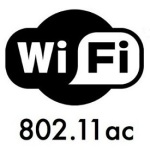
The security features provided by the IEEE 802.11 standard haven’t changed much since the 802.11i amendment was ratified in 2004, which is more commonly known by its Wi-Fi Alliance certification name WPA2. 802.11w protected management frames were introduced in 2009, but it is only recently that Wi-Fi chipsets for client devices have included support for it. WPA2 introduced the robust CCMP encryption protocol as a replacement for the compromised WEP-based encryption schemes of the past. CCMP utilizes stronger 128 bit AES encryption keys. As a general rule of thumb, if you aren’t using CCMP on a Wi-Fi network designed for security, you’re doing it wrong. It’s been out for a long time and older protocols have well-established weaknesses.
 However, there are some new encryption changes in the 802.11ac amendment which have mostly flown under the radar. Besides 256 QAM, wider channels, and MU-MIMO, 802.11ac now includes support for 256 bit AES keys and the GCMP encryption protocol. Galois Counter Mode Protocol is a more efficient and performance-friendly encryption protocol than CCMP.
However, there are some new encryption changes in the 802.11ac amendment which have mostly flown under the radar. Besides 256 QAM, wider channels, and MU-MIMO, 802.11ac now includes support for 256 bit AES keys and the GCMP encryption protocol. Galois Counter Mode Protocol is a more efficient and performance-friendly encryption protocol than CCMP.
A few interesting nuggets from section 11.4 of the 802.11ac amendment:
The AES algorithm is defined in FIPS PUB 197-2001. All AES processing used within CCMP uses AES with either a 128-bit key (CCMP-128) or a 256-bit key (CCMP-256).
And…
CCMP-128 processing expands the original MPDU size by 16 octets, 8 octets for the CCMP Header field and 8 octets for the MIC field. CCMP-256 processing expands the original MPDU size by 24 octets, 8 octets for the CCMP Header field, and 16 octets for the MIC field.
By the way, you can download the 802.11ac amendment or the entire 802.11-2012 standard from the IEEE here for free. For more on these security changes read sections 8.4.2.27 and 11.4 of the 802.11ac amendment.
It seems odd that these changes were included in the 802.11ac amendment, and not in a separate security-focussed amendment like 802.11w and 802.11i. Nothing wrong with it, just unexpected. I’m curious to see if the 802.11ax amendment includes security changes as well.
Why the addition of 256 bit AES keys? It could have something to do with a few chinks in the armor of 128 bit AES keys. The current attacks appear to be impractical, but future attacks that take advantage of quantum computing may put 128 bit AES keys at risk. NIST thinks that larger key sizes are needed to defend symmetric AES keys like those used in WPA2 against quantum computer attacks, which they say will be operational within the next 20 years. I’ll take their word for it.
Because the amendment only specifies CCMP-128 as mandatory for RSN compliance, it’s very unlikely that we’ll see CCMP-256/GCMP-256 in use anytime soon. Further, enabling 256 bit cipher suites effectively disables support for all non-802.11ac clients as well as 802.11ac clients that only support the mandatory cipher suites (most of them?). That’s because CCMP-256 and GCMP-256 pairwise keys are only compatible with 256 bit group keys, breaking backwards compatibility with legacy clients. There are also a lot of 802.11n clients out there that aren’t going away anytime soon, so actually deploying CCMP-256/GCMP-256 will require a separate CCMP-256/GCMP-256-only SSID. Excited yet?
Further, I can’t find any documentation that suggests that infrastructure vendors have implemented CCMP-256/GCMP-256 at all, just a few slide decks here and there with an overview of the changes. These cipher suites appear to be optional, so I wonder if any VHT clients or AP’s actually support them today, and when they will in the future. The Linux Wi-Fi configuration API cfg80211 and driver framework mac80211 have added software support for it. That’s about all the implementation I have found. Perhaps PCS compliance or Wi-Fi Alliance certification will eventually force the issue, or perhaps it will go the way of 802.11n Tx beamforming and never be implemented. There are a lot obstacles to overcome before 256 bit keys become practical.
However, a VHT client can negotiate a GCMP-128 RSNA within a BSS that uses a backwards-compatible CCMP-128 group key, and the 802.11 standard does support multiple pairwise cipher suites within a BSS (remember TSN’s?). That allows the GCMP-128 pairwise cipher suite to be used alongside everyday CCMP-128 pairwise and group keys on real, production networks.
To tell if a BSS is using one of the new cipher suites in a packet capture, look at a beacon frame’s RSN information element. The cipher suite selector is always 00-0F-AC for the CCMP/GCMP encryption protocols, it’s the cipher suite type that distinguishes between the specific cipher suites. For example, 00-0F-AC:4 is the default CCMP-128, 00-0F-AC:9 indicates GCMP-256 and 00-0F-AC:10 indicates CCMP-256. Group keys for a BSS with protected management frames have their own suite type numbers. Look for multiple pairwise cipher suites to find support for the new stuff. Here’s the table of the new cipher suites. I’m on the lookout for 00-0F-AC:8 (GCMP-128), but I’ve yet to find a beacon frame with it advertised.
Table 8-99—Cipher suite selectors
|
OUI |
Suite type | Meaning |
| 00-0F-AC | 4 | CCMP-128 – default pairwise cipher suite and default group cipher suite for data frames in an RSNA |
| 00-0F-AC | 6 | BIP-CMAC-128—default group management cipher suite in an RSNA with management frame protection enabled |
| 00-0F-AC | 8 | GCMP-128 – default for a DMG STA |
| 00-0F-AC | 9 | GCMP-256 |
| 00-0F-AC | 10 | CCMP-256 |
| 00-0F-AC | 11 | BIP-GMAC-128 |
| 00-0F-AC | 12 | BIP-GMAC-256 |
| 00-0F-AC | 13 | BIP-CMAC-256 |
Interesting note that GCMP-128 is the default for a DMG STA, which is a directional multi-gigabit station defined in the 802.11ad amendment for operation in the 60 GHz band.
The standard limits the mixing of cipher suites so that the key sizes of the pairwise and group keys must match, and GCMP group keys can only be used with GCMP pairwise keys.